Tag Archive: Research Tuesday
December 9, 2014
by Carole Zangari -
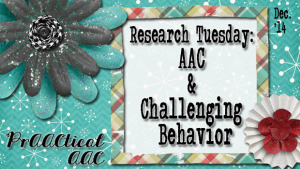
Research reviews are helpful tools for SLPs looking to implement evidence-based practices in their clinical work. In this month’s Research Tuesday post, we look at the work of Drs. Virginia Walker and Martha Snell, who conducted a meta-analysis to look at the relationship between challenging behaviors and AAC interventions. They looked at 54 different research studies with a total of 111 children and adults with AAC needs. They conducted both analytical and descriptive analyses. The research studies included participants at the emerging, prelinguistic, and multi-word levels of communication. Challenging behaviors were codes as distracting, disruptive, and/or destructive. Effect sizes were calculated using the Non-overlap of All Pairs method. Among their findings: AAC interventions reduce challenging behavior across a wide range of participants, including children and adults with a variety of developmental disabilities. AAC interventions were more effective with children (12 and under) than they were with adults (18 years and... [Read More...]
Filed under: PrAACtical Thinking
Tagged With: Challenging Behavior, FBA, FCT, Martha Snell, Research Tuesday, Virginia Walker
September 9, 2014
by Carole Zangari -

We’re back again with another Research Tuesday post, a series organized by Rachel Wynn of Gray Matter Therapy, in which bloggers are encouraged to write about a research article that they’ve read recently. (You may also know Rachel from her amazing work in advocating for ethical services in skilled nursing facilities.) For our September post, we look at a study done with babies to see how they like different AAC symbols. SLPs frequently assume that children with AAC needs better understand and prefer photos to other forms of picture symbols used in AAC. In this article, we look at the work of special educator Alexandra DaFonte whose work gives us some insight into this issue. In this study, she sought to determine if typically developing infants at 6, 9, and 12 months of age responded to two types of graphic symbols used in AAC: actual photographs and Picture Communication Symbols... [Read More...]
Filed under: PrAACtical Thinking
Tagged With: Alexandra da Fonte, babies, PCS, photos, Research Tuesday, symbols
August 12, 2014
by Carole Zangari -
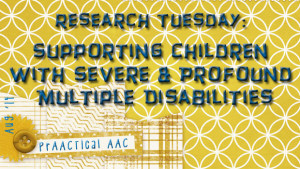
What do we know about the best ways to provide communication support to individuals with severe and profound multiple disabilities (PMLD)? PMLD is a term that generally refers to people who experience profound cognitive limitations in addition to sensory and/or physical disabilities. Many of these individuals have complex medical histories and chronic health concerns. Often, the communication difficulties experienced by individuals with PMLD cause them to be isolated and excluded from many social and educational opportunities. Despite their many challenges, there is evidence to suggest that AAC supports can help these children develop their communication skills. Not much is known, however, about how to structure the AAC intervention to maximize learning. In this study, Harding and her colleagues sought to reduce isolation and promote personal autonomy by providing AAC supports to two children with PMLD. As other researchers have demonstrated the positive impact of AAC on people with PMLD, this... [Read More...]
Filed under: PrAACtical Thinking
Tagged With: Harding, intervention, PMLD, Research Tuesday
July 8, 2014
by Carole Zangari -
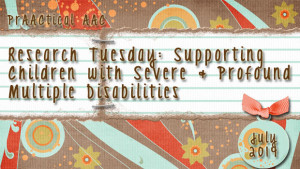
What do we know about the best ways to provide communication support to individuals with severe and profound multiple disabilities (PMLD)? PMLD is a term that generally refers to people who experience profound cognitive limitations in addition to sensory and/or physical disabilities. Many of these individuals have complex medical histories and chronic health concerns. Often, the communication difficulties experienced by individuals with PMLD cause them to be isolated and excluded from many social and educational opportunities. Despite their many challenges, there is evidence to suggest that AAC supports can help these children develop their communication skills. Not much is known, however, about how to structure the AAC intervention to maximize learning. In this study, Harding and her colleagues sought to reduce isolation and promote personal autonomy by providing AAC supports to two children with PMLD. As other researchers have demonstrated the positive impact of AAC on people with PMLD,... [Read More...]
Filed under: PrAACtical Thinking
Tagged With: classroom, PMLD, Research Tuesday
June 10, 2014
by Carole Zangari -
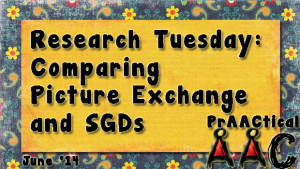
Picture exchange is powerful strategy for building symbolic communication in individuals with significant communication difficulties. We’ve posted about implementation of PECS a few times, and included references to research supporting its efficacy in some additional posts. Today, we look at a sequence of three single subject design experimental studies by Dr. Jeff Sigafoos and other researchers that looked at how the use of picture exchange and AAC devices (SGD condition) impacted social interaction. In the initial study, the team taught requesting skills either with picture exchange or AAC devices and then looked to see if there were any changes in social interaction. They hypothesized that the physical act of picking up a symbol and giving it to someone, as with the picture exchange condition, would make the learner less likely to turn away from his communication partner. So, in addition to measuring how well the participant learned to make requests,... [Read More...]
Filed under: PrAACtical Thinking
Tagged With: Jeff Sigafoos, picture exchange, research, Research Tuesday, SGD
March 11, 2014
by Carole Zangari -
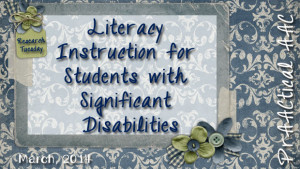
We all remember certain ‘firsts’ – your first bike, your first plane ride, your first car. One of my memorable ‘firsts’ is the first book I was ever given that was ‘just for me.’ I have fond memories of lazy summer afternoons with The Wishing Well, one of the Alice and Jerry basal readers. I may have broadened my library since that was given to me for my 4th birthday, but it still sits on my shelf and just paging through it brings back memories of being transported to another world. We can hardly imagine what life would be like without books. Reading brings us more than information. It allows us to explore, escape, relax, and dream. What must it be like to be deprived of the chance to learn and enjoy the printed word? Sadly, that is the reality for too many children and adults with AAC needs. In... [Read More...]
Filed under: PrAACtical Thinking
Tagged With: literacy, Research Tuesday
February 11, 2014
by Carole Zangari -
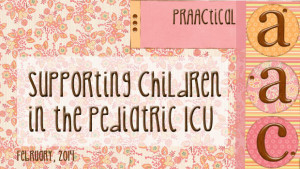
If there is anything scarier than having a very sick child in the ICU, it has to be when that child has no means of communication. In this Research Tuesday post, we join the efforts spearheaded by Rachel Wynn of Gray Matter Therapy to share an article that discusses the issues and presents some solution strategies. When we think of research studies in SLP, we think of experimental designs and randomized controlled trials (RCTs). In AAC, group research designs are uncommon because of the immense heterogeneity of this clinical population. Even limiting the study to one single disorder and age group, say teenagers with dysarthria secondary to cerebral palsy, contains too much heterogeneity for most group research. Instead, we see more single subject design experimental studies (SSEDs) in AAC. When well-designed, SSEDs have strong experimental control and allow researchers to answer causal questions, such as “did the treatment (e.g., teaching... [Read More...]
Filed under: PrAACtical Thinking
Tagged With: Boston Children's Hospital, communication vulnerable, healthcare, hospital, John Costello, Medical, Research Tuesday






